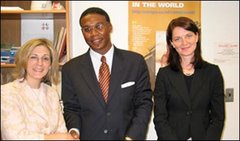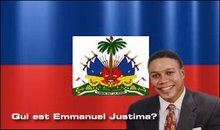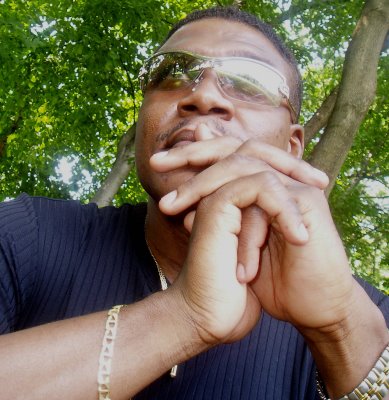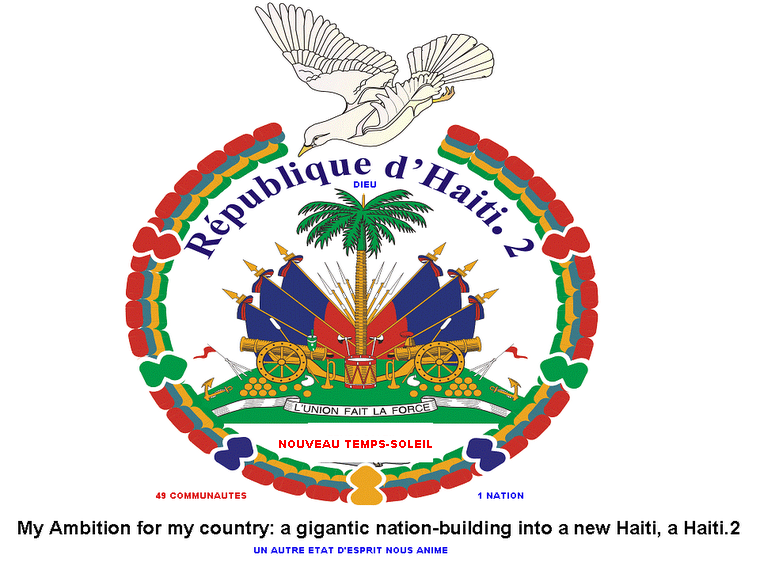
Justima, after discussions, posing with a Political Strategist in the US who is close to members of the US Congress and of the City Council of NY.
Who is Justima? Read Justima's Profile: http://www.blogger.com/profile/08397038063916519371
Biographical Notes
1- Justima is a co-founder of the St Gérard Technical Center. Along with his father Justin who was a high ranking official of the lay roman catholic organization “la Sainte Sainte Famille d’Haïti’’ (Holy Family of Haïti), they started the St Gerard Technical Center with the pastor of the roman catholic parish of St Gerard, the Belgian father Joseph Classens. Justima is the one who first equipped and the first who directed the studies and training at this vocational center in one of the most populous neighborhood of Port-au-Prince, the one of Carrefour-Feuilles. This experiment in the heart of a disadvantaged neighborhood has worked and today the St Gerard Technical Center is one of the most important private technical schools and vocational centers of the country.
2- Justima is a former journalist and former radio and TV news star anchor. He coordinated the first team of Radio Antilles International around 1984-1985, a leading news station of the Port-au-Prince Metropolitan area. That team included at the time Major Carrel Occil who became Lieutenant Colonel of the Armed Forces of Haiti and Military Commander of the North of the country.This has been twenty years now since he is no longer at Tele-Haïti, the only private cable TV station of Haiti. But the memories of his grand screen presence, that he was telegenic, his reassuring and captivating voice and diction and tone, the quality of news anchor he was, the fact that he was one of the most sought after and most intelligent and master of critical one-on-one interviews, are elements that are still in the minds of Haiti’s TV viewers. It is through that televised platform that the Haitian ‘bourgeois’ got to know him and how he got to know them.
Editor in chief and acting news director of the state-owned national radio in 1987 and during three months only, he gave to that national radio its first newsroom code, which was a first in any media in Haiti. Former member of the board of directors of the first Haitian Association of Journalists (AJH) after the departure of President Duvalier in 1986-1987, he was elected the same year at Caracas in Venezuela by his peers Latin-American journalists, Executive Secretary of the FELATRAP (Federacion Latino Americana de Trabajadores de Prensa). Subsequently, he was awarded the prize of best speaker and news anchor by the National Society of Professional Journalists of Alix Damour, and also the prize of most prestigious host of a political program on TV. He has presented numerous conferences and lectures on Haïti throughout the world, including in Aruba in 1987, in Singapore and Hong-Kong in 1995, etc. It is from his demonstration in the medias of his capacity to debate the great and burning questions of the day with the best leaders of the political class, that the middle and the intellectual class started considering him, as of 1986, as one of the most striking burgeoning flowers of the Haitian intelligentsia.
3- Justima, born in an average middle class family, has succeeded economically while still placing himself at the service of others. He was born on February 21, 1966 in the Isaïe Jeanty Maternity Hospital of Chancerelles in now the geographical communal division of the world famous popular slum of Cité Soleil. His friends and intimates tease him about a parallel they say they see between him and the national independence hero Francois Cappoix called « Cappoix la mort », who was born in 1776 and who himself turned forty in 1806. Justima, indeed, born exactly 200 years later turn forty in February 2006. His intimates who tease him, do so out of appreciation for his staunch and unwavering courage to dare face and confront his motherland’s Haiti secular challenges and problems that date 200 years that everyone is running away from because of their enormity and of the too real possibility to fail. Justima’s response: “M renmen peyi m” (i.e. I am in love with my country). It is said that Justima is a man who operates on a high mystical and spiritual plane field but who is quite humble for someone of his high level of intelligence placed at above 149 in 1999 and measured by his psychologist following a head injury resulting from a car accident the fist day of the year.
He went to school somewhat late compared to the children of his age; he was almost 7 years old. He skipped kindergarten and went straight to first grade. Due to his performance, they made him skip many grades at the primary school level to make up for his late start. He repeats often “It is on the knees on my mother Marie Céline that I have learned to read and write.” He calls his mother ‘Madame ma mère’ when he speaks of her and she would gladly tell you “Emmanuel never dares raise his voice on me”. The relationship with his mother, who has 8 other children, is one of a special, abiding and enduring love between the two that is even the envy of his siblings. He was fourteen, he was reading in front of a crowd of several thousands. He was the one who generally did the readings for the “Holy Family of Haiti”, a once influential lay Roman Catholic organization. That’s what gave him the springboard and impetus to jump to public life as a matter of Christian conscience and responsibility of an engaged faith. This exposure to great assembly of Christians is the reason why he is so used to and comfortable with large crowd.
He is a product of the national schools in Haiti, managed by mostly religious orders established in Haiti and supported by public funds. He completed his primary level schooling at the national school called after the late Pope John XXIII, a school located on the Boulevard of the once world famous bayfront “Bicentenaire” (built for Port-au-Prince Bicentennial). This school is managed by the Sacred Heart Friars on behalf of the state. These friars are also responsible for his secondary level schooling completed at the private College Canado-Haitian where he is still among the most famous alumni who ever wore the uniform.
Wanting to be grateful and to give back for the almost completely free primary schooling he received from the national school system, Justima attempted in 2001 to introduce, in various towns of Haiti, a program of assistance and of complete reinventing of the primary school system of the nation to meet Haiti today’s needs tomorrow’s demands. To that effect, he started the program “The children of la Relève”. La relève means the ones that will ensure succession and progression; taking over the baton and taking it further. This program pushed by a citizen movement for ‘la relève’ in our education system and in our classrooms, tried to meet the following objectives throughout the country, starting in 2000-2001 at Port-de-Paix, one of the most economically disadvantaged sections of the country:1) To change the nature and to raise the sub-standard and sub-optimal level of the education taught in our schools by concentrating on five key basic blocks of learning; a) concentrating on sciences, b) concentrating on mathematics, c) concentrating on languages, d) concentrating on history, including case studies of the history of commerce, of economic, industrial and social progress in Haiti and around the world, e) concentrating on social education to grow a new kind of citizenry and make up for parents who either are not up to par or are too busy and absent, and finally to reverse the free falling of moral values in the land.2) To raise the performance of teachers by a vast movement of mass retraining of all who teaches in Haiti regardless of the level, and to raise the level of performance of everyone who goes to school in Haiti so as to cause that each student is graded on average at a minimum c level, thus averaging out 70 out of 100 in each of the 5 concentrations areas. That would be a dramatic shift up in the capability curve and the academic performance of the nation since the official passing grade is now at a low 50 out of 100. Justima repeats often “You will continue to have a sub par and sub-standard country if you continue with a sub par education. We should even shoot for higher than the 70 out 100 passing grade of the US because we are the ones who are 200 years behind and who need to play catch up”.3) To introduce in each of these classrooms, modern teaching aids and didactic materials, including computers, that facilitate quick and compressed learning experiences; all in a preferably renovated and air-conditioned classroom.4) To raise the salary of these teachers associated with the program.5) To subsidize the parents to help them pay for their children school tuitions and to subsidize the administrations of these schools to help pay for electricity bills, telephones, internet access, and to help provide a daily nutritious hot meals to each child.
4- Justima, a natural visionary leader, cited in several books, periodicals and newspapers articles, is quite probably among the best communicators (almost in the same league with the popular President Aristide) and among the best specialists of social marketing of his country. He is one who resonates, with his gifted communication skills, with the average Haitian almost in the same way Aristide did. When he talks, he captivates Haitians. So, often, he is given the task to talk to the nation in difficult situations, such as reassuring the nation about the first CEP (the electoral board) of 1987 and launching the Notre Dame University project of Haiti’s Catholic Conference of Bishops in 1995, convincing Haitians to give money for the project in a country that was just trying to emerge in the aftermath of a devastating embargo imposed on Haiti.Viter Juste, the columnist of the Haitian weekly « Haïti en Marche », who is known for his perspicacity and rigor and accuracy in his remarks, wrote about Justima in the October 17, 2001 issue of ‘Haïti en marche”:
“It is indeed our sense and our opinion that the actual political class in Haiti,with may be a few rare exceptions, is incapable of resolving the problems of the country because this current classhas accumulated too much hatred. It is not ready to concede anything or to arrive at any compromise to save the nation that is dying. The many dinosaurs that form the so called opposition are incapable of producing an alternative governing plan. Their entire plan of government consists of a mountain of intrigues inassociation with the traditional enemies of the people. Therefore, who can blame those who think within themselves that all this political class should be put in a recycle box while Emmanuel Justima is claiming aloud that there is a team of young adults formed abroad in all the requisite disciplines that is ready totake over, to ensure la ‘relève’, that is to ensure succession, continuation and progression. Is it a crime against the nation to demand that a complete overhaul be ordered both withinthe ranks of the government and of the opposition? There are a lot of people who share Mr. Justima’s thinking. Mr. Emmanuel Justima, if you are able to join your deeds with your words, get to work, before the bark of the state collapses in these whitewaters of chaos, taking with it in its demise, thegovernment, the opposition, and the nation.”
Justima Emmanuel who found himself, at the end of 2003, as an active ordinary simple citizen, at the head of a multi-sector national group—which was trying to reframe the bicentennial commemoration of 2004 of Haiti’s 200 years of independence, in the midst of a political turmoil, in order to make these commemorations more personal and more meaningful to each citizen—is also the one who founded and launched HaitiCorps, in May 2000. It is this corps which is a more adaptive version of the US Peace Corps, that a lot of people of Haitian descent used to contribute money to reputable charitable organizations in the United States, in the aftermath of the September 11, 2001 tragedy in the support of the American people under chock. It is this corps which was developing 49 teams of collective and cooperative capability of simple ordinary citizens in 49 provinces of the country that mutated itself as the head of the spear of a National Movement of Simple Citizens, that became the backbone of the political regrouping “Action Démocratique” which sent Justima as its Presidential candidate to the February 7, 2006 Presidential elections, out of disgust for what happened on the day of January 1, 2004, out of impatience, out of duty.
Within the Haitian State and in addition to the national public radio station, Justima was a consultant and adviser to the top management at OFTAMA, the state-owned office of Workers’ Compensation Insurance and Disability and Maternity Leave. At the first electoral board in Haitian history put together in Haiti in 1987, he was more than just the simple deputy director of public relations, he was the first national spokesperson of the CEP— the Provisional Electoral Council— who had to balance on a daily basis the newly established CEP role and prerogatives with the government traditional turf.
In the business world, Justima made himself a reputation as a virtuoso of financial products marketing in the United States, working even as an adviser to top management of top financial services companies. He subsequently created his own firm in 1994, which is known in Haiti since 1995, mostly for having successfully promoted and launched the Notre Dame University of Haiti Project under a contract with Haiti’s National Conference of Catholic Bishops.
Justima has also acquired valuable experience in the industrial manufacturing area, having piloted complex projects of reorganization and of planned change, having developed participative and empowering employees processes within various companies, having raised employees ‘bellcurve’ capabilities, and having systematized work models to cause teams’ productivity and performance yield to grow. Lately, he is interested at a clinical approach of the many conditions that lower someone’s performance. He is the author of an unpublished doctoral dissertation on leaders and their performance as an agent of transformation. He is preparing also a book on Leadership in Haiti.
5- Justima studied Leadership and Change Introduction in Washington D.C. It is in the heart of the US federal capital at the world-class George Washington University that Justima completed his doctoral studies of Education and Leadership in Human Development. It is there he solidly grounded and academically anchored his know-how of a leadership approach of “maximum cooperation minimum tension”; a neuro-cognitive and psycho-technical approach of change introduction in many contexts of anaclitic depression such as Haiti, where groups of people who are already pugnacious and quarrelsome, panic when they have to change. He has also completed a Master’s of Science in Industrial management, hence his rational, technical, productive, pragmatic, pro-growth approach but in industrial quality and quantity.
Justima is a very mainstream Haitian who is still stuck to his modest roots like many successful people of his generation, the likes of the Haitian world's Megastar Whycleff Jean, who are not trying to be what they are not and separate themselves from “le peuple” as they say in Haiti but instead who reach back to lift some. Justima is more a citizen patriot and statesman for his times and not a career politician. He has created and made a business and made a payroll which is a rare event for traditional practitioners of politics. He is a born business man at heart and is the CEO of the JHJ, the diversified Justima, Holdings and Justima company which he had to shut down temporarily many years before the 2006 elections, victim of the current chaotic political situation of the country and which was totally abandoned for another sort of world player enterprise, JUSTIMA'GILL and its JPLI companies in the US and in Europe, via some strategic partnerships.
6- Justima is extremely qualified in the eyes of his fellow compatriots. Since 1995, he supported countless schools and financed a lot of school cafeterias. Out of his own funds, he repeatedly paid for hundred of school tuitions, helped hundred pay their rents, their medical bills, paid for funerals or weddings. But even so, it is none of that that qualifies him in the eyes of the average Haitian. What qualifies him is the very deep spirit of (re-)construction, i.e. of renewal and of restoration of his country from cursed to blessed that animates him. It is that deep divine push and pull from inward to find purpose in his life that has laid the vision of a Haiti.2 over a 25-30 year span into his heart and it is that important and powerfully attractive vision of a new Haïtianna, a new version of Haiti that operates at a higher level, that he champions and is trying to exemplify. That is what qualifies him. It is the multiple work and field studies that is has been conducting now for more than 10 years to draft that vision of Haiti.2 into 21 integrated plans of interrelated rapid development and transformation of 49 geographic areas of Haiti in 21 domains; that’s what separates him from the rest in the eyes of his compatriots. He comes ready and prepared for the nation’s top job, rather than talking without a plan. And more importantly, he finds a way in his plans to get every willing Haitian and able body in the country to get involved as a co-constructor and an executor in one of the 21 areas upon which the future is being built, regardless of age, sex, political affiliation or social class and specially to get involved the great masses shut down of the making of a country since 1804 and being forced to remain with the same shrinking slice of the national pie.Justima says “the country belongs to all of us. We are all his co-heirs and co-owners by virtue of the deeds and ultimate sacrifices consented by the great forefather and foremother of each of us. We each have the right, in practice not just in theory, to be its co-constructors and co-determinators and to live of its dividends from our fair share.”
Furthermore, Justima’s policy is :
" a) value every available human asset of the country, we have no Haitians to waste, we are not even enough to tackle the great many tasks of country-building which we must tackle and operate on, at once and simultaneously, to get any traction;
b) by necessity, call on also all Haitians abroad and on all people of Haitian descent worldwide and make them co-partners of the effort and co-partners of the profit and lead them back to the motherland as the great army of “retournés” (the ones that have returned home);
c) by necessity, call on all people of skills and of all nationalities worldwide and specially all skilled and influential and wealthy black and mulatto of the Caribbean, of the US, of Africa and of the rest of the world, make them make Haiti, as expatriates, the newest great land of opportunity in the Americas like Dubai and Shanghai are in the Far east.” Turn them into adoptive naturalized Haitians also so they can fully reap what they helped us sow.
That’s Justima’strategic agenda of "grafting" in order to add on quickly the skilled, experienced people and the billions Haiti currently does not have to lift millions struggling Haitians at a time. Justima gets it. That is what qualifies him. He has that unique plan to increase quickly and massively our absorptive capacity if we are to reach our goal of massive, rapid industrialization, technical advancement and sophistication of services for the massive and rapid advancement of our population. This is why he is a President-in-waiting and that so many in Haiti, noticeably among former President's Aristide backers, and so many around the world (who took notice of his likability and electability among young men and women of the urban areas and urban masses, and among the peasants of the country side who feel elevated in his 48 more communities other than Port-au-Prince message), have started putting together "Friends Backers of Justima" committees to push him all the way.
7- Justima, who has never lost an election, in which he seriously and fully competed when he is backed by the full array of resources and organization necessary, is perceived as the new blood and as the fresh face of the Haiti of tomorrow. He has something about him of fresh vision and of clear soul and a different kind of charisma which makes you lower your defenses to put yourself at ease to want his leadership, to trust his judgment and work with him. You see him as the man of great synthesis who constantly searches to simplify the complex, and as the man whose loyalty never fails. This is why in many instances, he has been entrusted with the leadership in situations in which there was the need to be imaginative, to come up with something different, to force and defy the odds at every step and to put it all together in a final product in which every one would recognize himself and herself and would have a fair stake in the outcome. He is a more deeply spiritual than religious man who prays a lot daily before doing anything, a family man who will become one day in the eyes of many the most attractive and polished Haitian president, since 1986 of the Duvalier post-era, with the look and the appropriate gravitas and stature for that. Since primary school to secondary school, he has been regularly either selected or elected president of his class, which is a tell tell sign. Justima is one of the three main initiators and founders of the 11 political parties caucus called “ The Block Alternative”, one of the 4 main political block of Haiti along side with the Lavalas offsprings, and the two competing Haitian convention and National Council of political parties.
Justima has started a foundation_Fondation Justima For Democracy and Pilote Development_firstly, to give the masses a breather when it comes to the spiraling costs of food and daily basic necessities, and secondly to pick 3 domains or areas of intervention in Haiti in which he can start showing Haitians and the world, concretely and on the ground, what physical transformation in each of these 3 areas and what life-altering, life-transforming solutions, innovations and changes he can achieve that lead to mass advancement of the people in these areas. Thirdly and lastly, his foundation joins the leading ranks of those promoting public policies in favor of social and economic justices, in favor of intelligent but profitable stewardship of the environment, and in favor of real and definitive fix of the conditions of poverty and underdevelopment.
Justima, called affectionately either “PDG” or “President Tima” by his intimates, is a man who adores make people laugh and he is a father of two.
By Friends Backing Justima/Par Les Amis qui Poussent Justima
HAITI.2@live.com
.jpg)






No comments:
Post a Comment